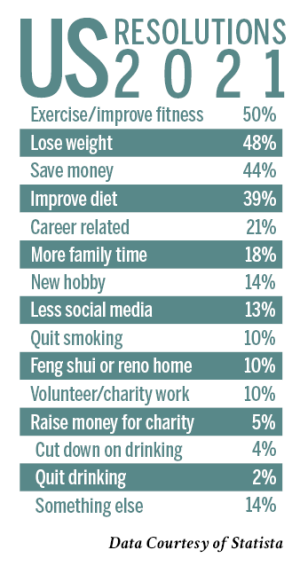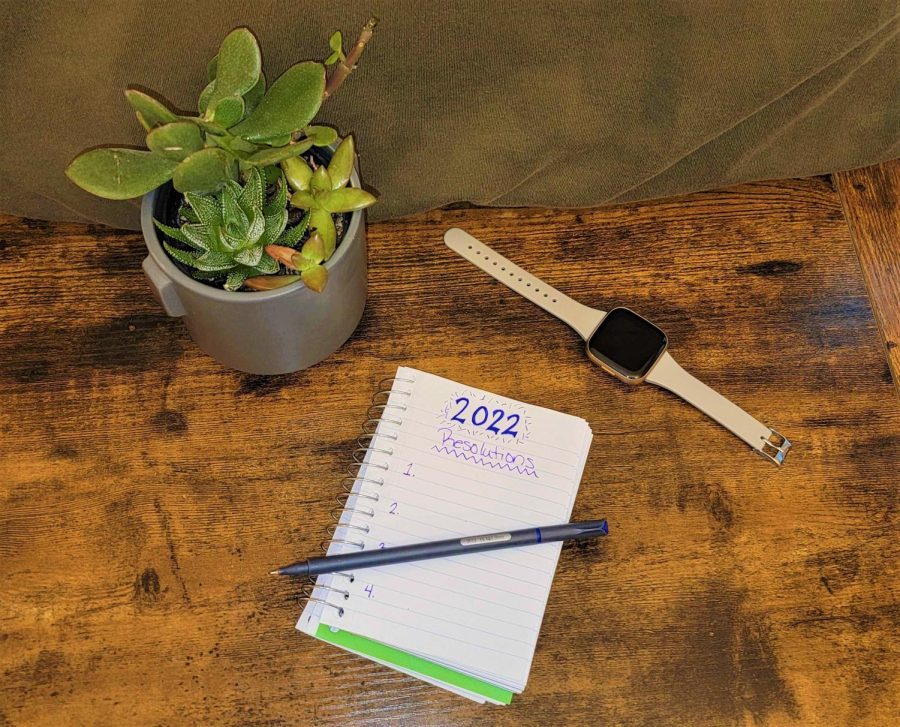Ditch the New Year’s resolutions
January 12, 2022
Every year, millions of people around the world participate in an ancient tradition that has since been transformed and mangled into something completely different: New Year’s resolutions.
This practice, which History.com credits to the ancient Babylonians, first started as a ritual where people would make new promises to the gods to change habits, repay debts or resolve to be better in the future.
Sounds familiar, sure, but especially in the U.S., New Year’s resolutions tend to look the same for everyone: lose weight and save money. I’ll be honest, these were my go to resolutions when I was still making them.
It’s difficult not to default to weight loss and personal finance. Companies announce the newest weight loss programs they have around this time. People are feeling the extra weight from the holidays and the general inactivity the winter brings. The promise of beach days and summer bring with it a desire to look the best in that swim wear. A lot of people have to have extra spending money to travel to achieve those beachy dreams.
But does everyone succeed? 
My personal success rate left much to be desired. I’m not alone. An article published by UAB Medicine states, “Less than 8% of people actually stick to their resolutions each year, according to some estimates, yet millions of Americans continue to set goals with high hopes of a better year ahead.”
Let’s be honest, failing at attaining resolutions can feel pretty depressing. According to Psychology Today, many who fail at keeping resolutions end up feeling depressed or experience a reduction in self-esteem.
A few years ago, I had to find a way to combat the defeated feeling I felt when I realized I forgot about my resolution and felt it was too late to start again. So, I decided I wouldn’t participate in the tradition. I didn’t succeed with my goals that way any way and needed to change how I went about goal setting.
Now, I incorporate goal setting into my weekly planning. If I think about it less as setting a goal, and more of a “I plan to do this, and this is when it’s happening,” I find I have better success at achieving my goals.
This can be something as simple as setting a habit to read or chunking out a time for some self-care. But I also have bigger long term goals that have a space in the front of my planner. Things like drinking more water, fixing my relationship with food, finding time to add movement into my day. These bigger goals get put in the notes section of each month. The habit goals, like drinking water and moving more, are the ones that get added to my weekly planning.
Every Sunday, I sit down with my planner. I plan out when I will complete my assignments, and add appointments and other general life events. I add my short term goals to the notes section. If there is an action I can do to help me complete a short term goal, I add it into my week, along with a reward for completing the action.
It has helped me immensely to add in this small ritual. It allows me to focus on my goals, and it helps me put things into action faster than when I set annual resolutions. No more “I’ll wait until the first of the year.” Now when I think of a goal, I just make a plan and act on it.
So if you have trouble accomplishing resolutions like me, just ditch them. It’s freeing, and bonus, your mental health will thank you.


